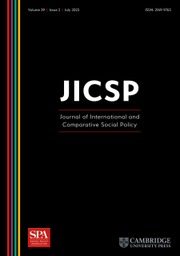Crossref Citations
This article has been cited by the following publications. This list is generated based on data provided by
Crossref.
Chiang, Min-Hua
2018.
Post-Industrial Development in East Asia.
p.
153.
Yuda, Tauchid Komara
2019.
Healthcare decommodification in decentralization context: Reviewing the ideational constructions of “classless hospital policy” initiatives in Kulon Progo Regency, Indonesia.
Asian Social Work and Policy Review,
Vol. 13,
Issue. 1,
p.
58.
Kanchoochat, Veerayooth
2019.
Developmental State Building.
p.
47.
Lim, Sijeong
and
Tanaka, Seiki
2019.
Work disincentive perceptions and welfare state attitudes: A survey experiment in South Korea.
Governance,
Vol. 32,
Issue. 3,
p.
457.
Klingler-Vidra, Robyn
and
Pacheco Pardo, Ramon
2019.
Beyond theChaebol?The Social Purpose of Entrepreneurship Promotion in South Korea.
Asian Studies Review,
Vol. 43,
Issue. 4,
p.
637.
Yuda, Tauchid Komara
2019.
Welfare regime and the patrimonial state in contemporary Asia: visiting Indonesian cases.
Journal of Asian Public Policy,
Vol. 12,
Issue. 3,
p.
351.
Zhang, Yuxi
2020.
“Promotion tournament 2.0”: Why local cadres expand health‐care provision in China.
Governance,
Vol. 33,
Issue. 4,
p.
897.
Yuda, Tauchid Komara
2020.
Re-examining the institutional layering of social policy configuration in Indonesia.
Journal of Asian Public Policy,
Vol. 13,
Issue. 3,
p.
353.
Yuda, Tauchid Komara
2020.
Reappraisal of the political approach on East Asian welfare state development: the case of childcare expansion in South Korea.
International Journal of Sociology and Social Policy,
Vol. 40,
Issue. 7/8,
p.
677.
Maags, Christina
2020.
Long‐Term Care Insurance Adoption in East Asia: Politics, Ideas, and Institutions.
Politics & Policy,
Vol. 48,
Issue. 1,
p.
69.
Yu, Sam Wai-Kam
Chau, Chui-Man (Ruby)
Li, Sze-Man
and
Lee, Mei-Yin (Anna)
2021.
The government’s responses to incompatibility challenges to women: the case studies of Hong Kong and Taiwan.
Journal of International and Comparative Social Policy,
Vol. 37,
Issue. 1,
p.
50.
Yeh, Chung-Yang
and
Ku, Yeun-Wen
2021.
Welfare attitude and economic developmentalism in new democratic developmental welfare state: an examination of the Taiwanese case.
Journal of Asian Public Policy,
Vol. 14,
Issue. 1,
p.
13.
Yuda, Tauchid Komara
2021.
The evolving Korean childcare regime.
International Journal of Sociology and Social Policy,
Vol. 41,
Issue. 9/10,
p.
1089.
Soon, Suetgiin
Chou, Chelsea C.
and
Shi, Shih‐Jiunn
2021.
Withstanding the plague: Institutional resilience of the East Asian welfare state.
Social Policy & Administration,
Vol. 55,
Issue. 2,
p.
374.
Yuda, Tauchid Komara
2021.
The complementary roles between clientelism and familism in social policy development.
Social Policy & Administration,
Vol. 55,
Issue. 7,
p.
1370.
Lim, Sijeong
2022.
Making Sense of the Gender Gap in South Koreans’ Attitudes towards North Korean Defectors.
Journal of Refugee Studies,
Vol. 34,
Issue. 4,
p.
3926.
ERGELEN, Semih
2022.
Güney Kore’de Refah Devletinin Tarihsel Gelişimi Üzerine Bir İnceleme.
Sosyal Güvenlik Dergisi,
p.
99.
Laliberté, André
2022.
Chinese Religions and Welfare Regimes Beyond the PRC.
p.
131.
Hu, Bo
and
Chou, Yueh-Ching
2022.
Care poverty among older adults in East Asia: A comparison of unmet care needs between China and Taiwan.
Archives of Gerontology and Geriatrics,
Vol. 102,
Issue. ,
p.
104738.
Yeh, Chung-Yang
and
Lue, Jen-Der
2022.
The political dilemma of the social investment transformation in Taiwan: lessons for newly industrialized welfare states.
Journal of Asian Public Policy,
p.
1.




